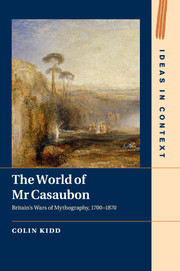Book contents
- Frontmatter
- Contents
- Acknowledgements
- 1 Prologue: Casaubon's Dubious Bequest
- 2 The Key to All Mythologies
- 3 The Legacies of the Ancients in Enlightenment Mythography
- 4 The Obsessions of Jacob Bryant: Arkite Idolatry and the Quest for Troy
- 5 The Dispute of the Orient: Anglo-French Rivalries in an Age of Revolution
- 6 Fish-gods, Floods and Serpent-worship: From Apologetics to Anthropology
- 7 Epilogue: The Keys to All Mythology in 1872
- Index
- Miscellaneous Endmatter
5 - The Dispute of the Orient: Anglo-French Rivalries in an Age of Revolution
Published online by Cambridge University Press: 24 November 2016
- Frontmatter
- Contents
- Acknowledgements
- 1 Prologue: Casaubon's Dubious Bequest
- 2 The Key to All Mythologies
- 3 The Legacies of the Ancients in Enlightenment Mythography
- 4 The Obsessions of Jacob Bryant: Arkite Idolatry and the Quest for Troy
- 5 The Dispute of the Orient: Anglo-French Rivalries in an Age of Revolution
- 6 Fish-gods, Floods and Serpent-worship: From Apologetics to Anthropology
- 7 Epilogue: The Keys to All Mythology in 1872
- Index
- Miscellaneous Endmatter
Summary
[I]t is a pity that it [Casaubon's labour] should be thrown away, as so much English scholarship is, for want of knowing what is being done by the rest of the world.
(Middlemarch, ch. 21)Poor Mr Casaubon himself was lost among small closets and winding stairs, and in an agitated dimness about the Cabeiri.
(Middlemarch, ch. 20)Anglo-German differences in the science of mythology, as we know, supply one of the crucial pivots in the plot of Middlemarch. Casaubon's cousin Will Ladislaw, an artist and man of the world, is aware that German philology, theology and mythography were far in advance of their English counterparts. Eliot was, of course, dramatising her own exposure to the German Higher Criticism and the effect it had on her own religious and philosophical beliefs. Nevertheless, she concealed from her readers another set of Anglo-Continental tensions which had a decisive influence on the formation of Anglican mythography between the 1790s and 1830s. Her reticence is understandable, for a triangular set of intellectual relationships is less easy to transmute into literary drama; the contrasts would be much less well-defined. On the other hand, complexity of this sort was rarely a deterrent to a novelist of Eliot's sublime gifts.
Yet behind the plot of Middlemarch lies an unacknowledged Anglo-French back story: a massive affair which constituted one of the dominant themes in the English response to French radicalism during the era of Revolution and Reform. As George Eliot knew, though she did not say as much in Middlemarch, Mr Casaubon's mythographical enterprise arose from the need to combat the spread of a subversive Gallic strain of infidel mythography associated in particular with the works of Volney and Dupuis. When the cosmopolitan Ladislaw condemns English scholarship, and particularly that of his kinsman, for ‘want of knowing what is being done by the rest of the world’, he (or Eliot, his puppeteer) is being unfair. The deistic philosophes and demythologising ideologues of late eighteenth-century France spurred the urgency and hot polemical engagement of Anglican mythography in the generation after Bryant. As Jon Mee has argued, during the turbulent years of the French Revolution a conservative ‘syncretism’, grounded in the ‘discourse of speculative mythography’, provided a vital prop against the threat of subversion.
- Type
- Chapter
- Information
- The World of Mr CasaubonBritain's Wars of Mythography, 1700–1870, pp. 131 - 175Publisher: Cambridge University PressPrint publication year: 2016

